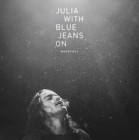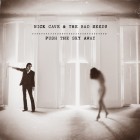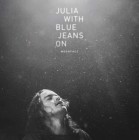Music Nerd Recommends: A Touch of Melancholy
Hello again, Music Nerd here. With this post, you may start to notice a pattern: I listen to a lot of sad music. It’s not all I listen to, but for whatever reason, no matter the genre or the artist, the saddest song on the album is probably my favorite. I’m not an unhappy person, but I think we need to acknowledge the sad side of life to be able to appreciate the joy. As the great Leonard Cohen once crooned, “There is a crack in everything / that’s how the light gets in.” I’ll try to balance out the darkness with peppier stuff as well, but for this week, let’s delve right into a couple straight-up weepers.
 Julia With Blue Jeans On by Moonface
Julia With Blue Jeans On by Moonface
Available digitally from Hoopla.
Spencer Krug is the mad genius behind the Moonface moniker, and he tends to keep very busy. He’s been a member of Sunset Rubdown and Wolf Parade, as well as numerous other bands and side-projects. I’ve really enjoyed everything he’s put out as Moonface, but I haven’t really been able to get into the rest of his sprawling body of work, partially because the sheer density of it seems overwhelming. Sparsity is the keyword here, though; for this album, he cloistered himself away in a studio in Helsinki and rediscovered his classical piano training. Lyrically, it is much more straightforward than most of his releases, dealing with those big, classic themes of love, loss, and life itself.
I’ve seen other reviewers refer to this as a breakup record. I don’t see it that way. It is bleak in places yes, but that darkness is shot through with a certain slant of optimism, that, to me, sounds rooted in a relatively stable relationship at its center. There are many references to life changes, and yes, some mention of heartbreak, but the concerns of this album seem based more around uncertainty and change. “Everyone has found themselves at the end of their rope / Looking up at the boat / Saying, ‘I don't know’” he sings on Everyone is Noah, Everyone is the Ark, “‘I don’t know if I can call this home’.”
The title track begins in that same dark place, but shifts to a major key midway through, and blooms into an uplifting ode to a lover “as beautiful and simple as the sun.” The album ends on this note as well, after a virtuoso display of Krug’s piano skills: in Your Chariot Awaits the titular vehicle is one that will take you “beyond despondency.” To me this is a perfect album to listen to when you need to acknowledge the darkness, and need something beautiful to help lift you up out of it.
 Push the Sky Away by Nick Cave and the Bad Seeds
Push the Sky Away by Nick Cave and the Bad Seeds
This album probably belonged in my Top 5 of 2013, to be honest, but happenstance conspired to keep it off the list. Let me rectify that now, and tell you how much I love it. I have long been a big fan of Nick Cave’s work, and given my aforementioned tendency towards sad music, I was destined to love this one. It’s a much mellower work than most Bad Seeds records--though unlike beautiful acoustic effort The Boatman’s Call (which we don't have currently, but worth ILL-ing, for sure), I wouldn’t call this album “stripped down.” This is very much a full-band, plugged-in record. It’s just a full electric band playing quieter, more reserved songs.
Sonically, it continues exploring the kinds ragged textures and experimental techniques that Cave and right-hand-man Warren Ellis have been developing on their soundtrack work and with side-project Grinderman. The arrangements alternately swirl and snarl as necessary, creating a wholly realized atmosphere for each song to inhabit, full of lush violins, ominous bass grooves, and otherworldly but strangely organic keyboard and electronic loops. This music sounds not only lived-in, but alive in and of itself.
It’s against this backdrop that Cave weaves his tales of sorrow, degeneracy, and redemption. He’s always been known for his lyrics, but I get a sense on this album of a renewed focus on Cave’s more writerly qualities. The local boys in Water’s Edge “reach for the speech and search for the word,” as the lyric folds in on itself and twists around sexual innuendo and existential dread. Jubilee Street is the story of a girl who “had a history, but she had no past,” and her ambiguously-tragic encounters with the narrator of the song, who brings with him a “ten-ton catastrophe on a sixty-pound chain.” All the lyrical gloom is balanced by Cave’s dark sense of humor, however: “The past is the past, and it’s here to stay” he proclaims in the Gwendolyn Brooks-referencing We Real Cool, and immediately follows it up with “Wikipedia is heaven.” It’s a mostly dark and brooding album, yes, but it’s also a lot of fun.
There you have a couple of Melancholy albums to keep you company, to commiserate with through these long last weeks of winter. If you listen to these albums, let me know what you think in the comments; were they too depressing, just depressing enough, or do you long for something even sadder? I could find you something, I'm sure!













